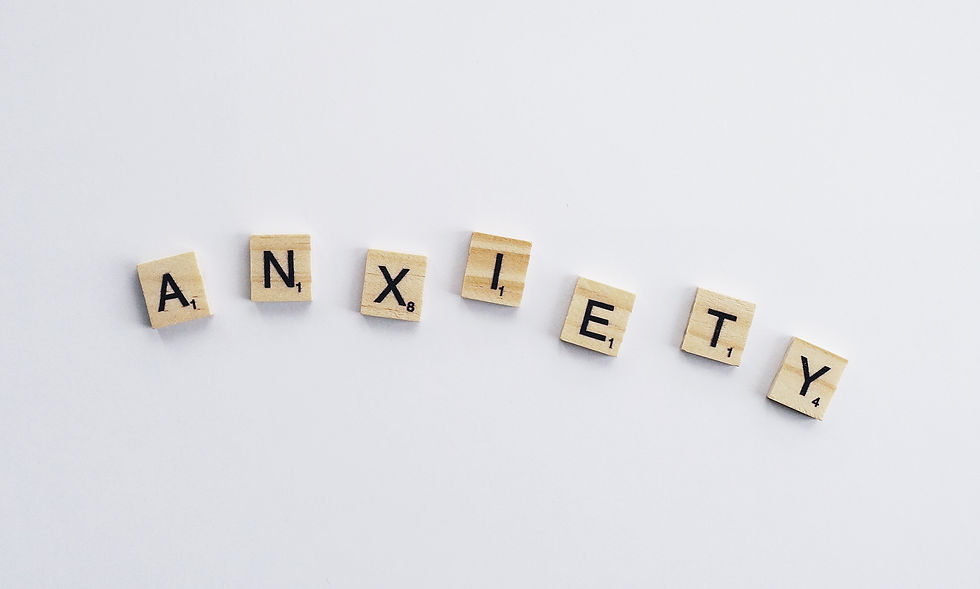What do I do about anxiety?
- Adam O'Neill

- Aug 15, 2022
- 3 min read
Updated: Aug 3, 2023

Whether prior-to a doctor’s appointment, before a big exam, after a car accident, or any other number of fear-inducing situations, we’ve all experienced that heart quickening, chest tightening, stomach-churning sensation of anxiety. For some, these brief moments turn into weeks, months, and even years of anxious thoughts and sensations; and for others, it worsens to panic attacks that come on suddenly and can feel, as described by many, like a severe asthma or heart attack.
Anxiety is the most common mental health condition in the United States, and most recent studies show its prevalence is increasing. So what do we do about this ubiquitous condition?
First, we need to rule out physical causes. Hyperthyroidism (too much thyroid hormone), hypoglycemia (low blood sugar), anemia (low iron), and other common medical conditions can mimic or stimulate anxiety. Your provider may order basic blood work to check for these.
Next, we need to assess your diet, sleep, and exercise (or lack thereof) which can all contribute to or make anxiety worse. Simple sugars and processed or packaged foods tend to send your blood sugar spiking or crashing. A diet of lean proteins and healthy fats (such as avocado, olive oil, nuts and seeds) can keep blood sugars stable. Keeping a consistent sleep schedule helps regulate our circadian rhythm and can improve anxiety. I tell my patients, though we can’t always control when we fall asleep (especially with anxiety) we can control when we wake up. Avoid the temptation to push the snooze button on days when you struggle to fall asleep. Exercise is one of the best natural (and side effect free) remedies to combat anxiety. Literature suggests >150min of moderate intensity exercise a week, though if we can’t achieve that number, the phrase “Anything worth doing is worth doing poorly” applies.
After this, we identify the source of your anxiety. Journaling is a great way in between counseling or psychiatry appointments to document our thoughts. Look for cognitive distortions such as catastrophizing (assuming the worst will happen), black and white thinking, or mind reading (assuming what someone else is thinking/feeling).
Once we have identified the source of anxiety, we work to change our orientation towards it. The psychologist Carl Jung said, “Whatever we resist, persists.” Fighting anxiety only tends to make it worse. Instead, I recommend patients view anxiety as a sign that God has made their body to work well! Anxiety is your body working to keep you safe and free of danger. When you feel your heart rate quicken, take a deep breath, notice it, and thank God that you have a body that works to keep you safe.
Medications and supplements can be helpful in treating anxiety, but they should never be the sole coping mechanism. Supplements like GABA, l-theanine, and magnesium have been used for anxiety. Serotonin agents like buspirone, escitalopram, and fluoxetine have been used, although these require a prescription. Be sure to talk to your doctor about medications and supplements before trying them because they are not without side effects and interactions/contraindications. If you don’t have a mental health provider, consider reaching out to your family medical provider. If you prefer to see a specialist, look for a psychiatrist, psychiatric physician assistant, or nurse practitioner like the ones we employ at Adam O’Neill & Associates.
Finally, as I discussed in my book The Mind After Eden: Psychiatry in a Post-Fall World, anxiety is rooted in a mindset of scarcity (there isn’t enough). Gratitude is a natural antidote to anxiety because it directly works against anxiety by selectively paying attention to what we do have rather than what we lack. As Christian’s, we have been instructed to approach anxiety this way: “Do not be anxious about anything, but in everything by prayer and supplication with thanksgiving let your requests be made known to God” (Philippians 4:6, ESV).
A holistic approach to anxiety requires an assessment of each of the elements above. Though anxiety may be prevalent, there is hope. If you have questions, or would like to meet with a provider for Christian psychiatry services, call 703-261-4177, or email office@aoavirginia.com.




Comments